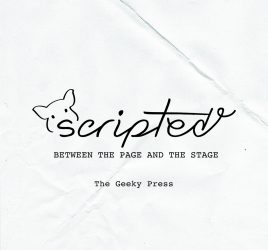On Wednesday, November 12, 6 authors will gather at Indy Reads Books as part of The Downtown Writers Jam, Vol. 2 hosted by The Geeky Press. We’re currently curating those authors, and taking recommendations from friends, colleagues, and other people involved in the Indiana writing scene. Don’t wait to be nominated, though. You can submit your work for consideration.
Meanwhile, we wanted to introduce you to our sixth — and final — author: Ben Tanzer.
 I am the author of the books My Father’s House, You Can Make Him Like You, Lost in Space, Four Fathers, which I co-authored with Dave Housley, BL Pawelek, and Tom Williams, and Orphans, which won the 24th Annual Midwest Book Award in Fantasy/SciFi/Horror/Paranormal, among others.
I am the author of the books My Father’s House, You Can Make Him Like You, Lost in Space, Four Fathers, which I co-authored with Dave Housley, BL Pawelek, and Tom Williams, and Orphans, which won the 24th Annual Midwest Book Award in Fantasy/SciFi/Horror/Paranormal, among others.
I also contribute to Men’s Health, direct Publicity and Content Strategy for Curbside Splendor, and can be found online at This Blog Will Change Your Life, the center of my vast, albeit faux, lifestyle empire. Before all of this though, the books, the narcissism, and the endless obscurity, I thought about my need to write all of the time, but was overwhelmed by the impossibility of it. When I hit thirty, however, I thought, now or never, and luckily there was a story, and I ever had to consider what never might look like.
You can follow Ben at his website or on Twitter.
At The Downtown Writers Jam
What’s the name of the piece from which your DWJ story comes? End of Story.
What was the question or idea that sparked that original piece? After writing a collection of essays about being a father, I wanted to write about a time when the idea of children was just that, an idea.
Where can people find or buy your work? You can find the collection of essays, Lost In Space, at Curbside Splendor.
What should the audience expect from your storytelling at the Downtown Writers Jam? Besides a light show and fog machines? Do they need anything else? Well if they do, they can expect laughter and tears, and loads of energy. They can also expect hugs, if they ask nicely, and even if they don’t.
Get to Reading
Best book or long-form writing we should read, but probably haven’t? And why? I’ve been re-reading The Basketball Diaries for an essay I’m writing, and while I am reminded why I have always loved it, all real-time and pulsing with live wire energy, I am also amazed how few people I know have read it.


One comment